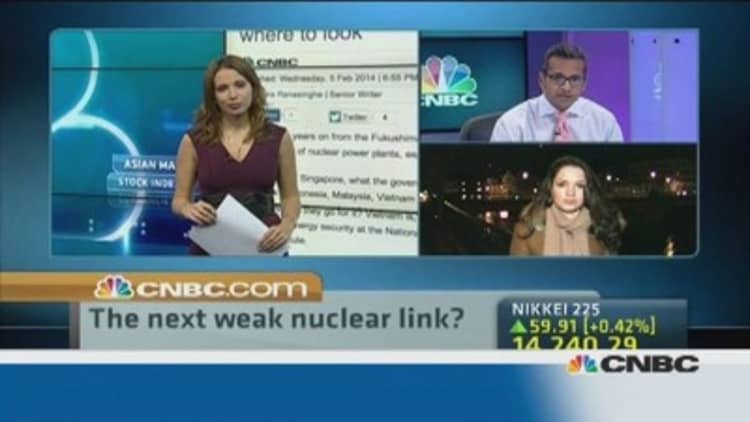Atomic power is gaining currency in the global energy market, former New Jersey Gov. Christine Todd Whitman told CNBC this week, arguing that nuclear should be considered part of the arsenal in the fight against global warming.
"It's not a silver bullet that will solve our energy problems … but if you care about clean air and heavy dependence on fossil fuels … nuclear should be part of the overall consideration," said the two-term governor, who now co-chairs the Clean and Safe Energy Coalition (CASEnergy), an advocacy group funded by the Nuclear Energy Institute.
Nearly three years after a tsunami triggered a nuclear disaster at Japan's Fukushima Daiichi station, nuclear's proponents are trying to exorcise the demons that have haunted the sector. With the U.S. ramping up oil and gas production, though, nuclear energy has dropped off the radar.
(Read more: Japan's nuclear restart bogged down in safety checks and paperwork)
Whitman, a former Environmental Protection Agency (EPA) administrator, said it would be a mistake to push nuclear power out of the picture. Despite the large investment costs and the risks associated with storage and contamination, it should remain part of the energy conversation, she told CNBC in an interview.
Since Fukushima in March 2011, former opponents—including a few in the environmental movement—are more willing to discuss nuclear power, according to Whitman.
"There is some movement, but it's not what it needs to be if you're going to keep nuclear at 19 percent" of U.S. electricity generation, she added.
With fracking leading to explosive fossil fuels production, Whitman insisted that nuclear power is a useful counterpoint to push back against dirtier energy sources such as coal and natural gas.
(Read more: Going nuclear—and small—with new type of reactor)
"A lot of the environmental groups are never going to embrace nuclear, but they aren't fighting it as they once were," Whitman said. "They care about climate change" and don't want to see natural gas dominate the U.S. energy mix.
The U.S. has 65 nuclear power plants with 104 operating reactors, according to the Energy Information Administration. They generate nearly 800 billion kilowatt-hours (kWh) of electric power. At least four smaller reactors are under construction, and about a dozen more are being considered by the Nuclear Regulatory Commission.

Still, high capital costs and security risks are cited as barriers to widespread adoption. A 2009 study by the Union of Concerned Scientists (UCS)—which calls nuclear power "inherently hazardous"—found that costs for new plants had risen from between $2 billion and $4 billion per plant, to $9 billion.
"A major expansion of nuclear power in the United States is not feasible in the near term," the UCS said on its website, adding that "new plants could not make a substantial contribution to reducing U.S. global warming emissions" for at least 20 years.
"Until long-standing problems regarding the security of nuclear plants … are fixed, the potential of nuclear power to play a significant role in addressing global warming will be held hostage to the industry's worst performers," the group said.
(Read more: Five miles, 350,000 mirrors, and a cloudy future)
Whitman doesn't dispute the expense of building plants but insisted that initial costs are eventually recouped via the cheap power provided. Environmental and security concerns are often overstated and are partly the result of unfair portrayals in media.
"What [people] know about nuclear, either through 'The Simpsons' or Fukushima and Three Mile Island … none of them are representative of nuclear energy," Whitman said, adding that used nuclear fuel can be stored safely underground.
Atomic energy "is not going to be something for every area," she said, "but helping us address issues of air quality and greenhouse gases—and we need safe, reliable, affordable power."
—By CNBC's Javier E. David


